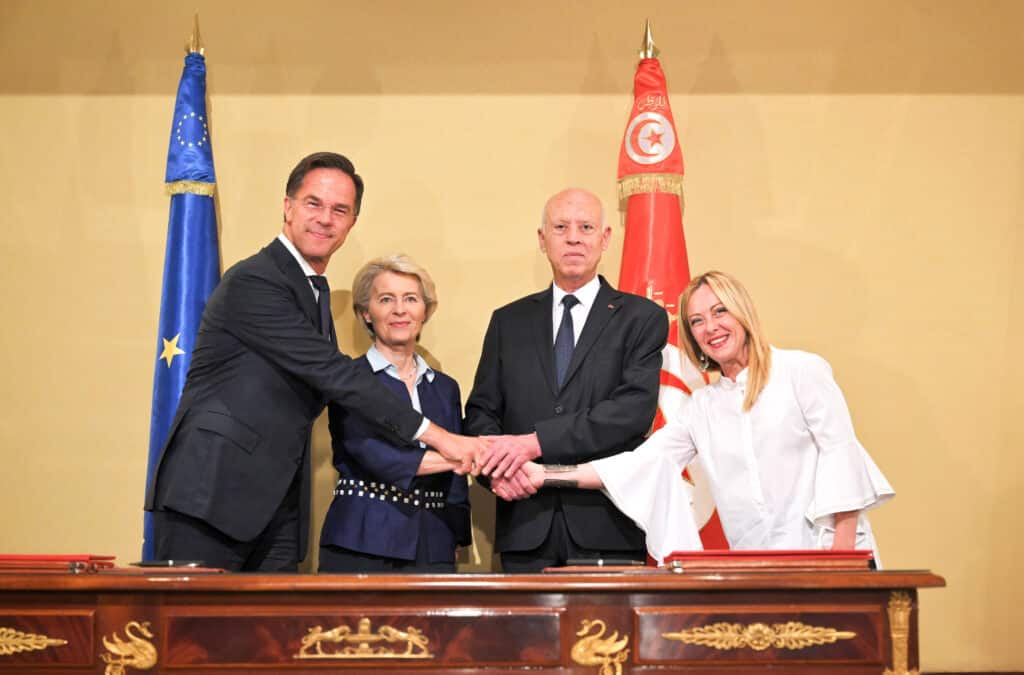Photo: European Commission
On 16 July 2023, the EU signed a migration deal with Tunisia, as announced a month earlier. The deal includes an aid package worth more than €1 billion designed to support the Tunisian economy and strengthen Tunisian border control, with the aim of reducing the number of refugees entering Europe. The deal is highly controversial because of the direct support it offers to the repressive and autocratic regime of Tunisian President Kais Saied, with no many conditions attached. In addition, human rights are far from adequately recognised in the agreement. The shortcomings of this agreement were quickly exposed when the disastrous Tunisian deportation of Black immigrants to deserts near the militarised Libyan and Algerian borders continued after the agreement was concluded. These forced expulsions are a serious violation of international law and human rights. This article explains how Tunisia is illegally deporting Black refugees despite its deal with the EU.
Xenophobia and racism in Tunisia
In February 2023, President Saied made several racist statements in a speech in which he talked about "hordes of illegal migrants from sub-Saharan Africa" coming to Tunisia, bringing with them "violence, crime and unacceptable practices" that are consequences of a criminal plan intended to change "the demographic composition" of the country. As a result of Saied's racist rhetoric, racist hate speech, discrimination and violent attacks increased dramatically, particularly targeting Black refugees in Tunisia. According to Wadih al-Asmar, president of EuroMed Rights, President Saied is using African refugees as a "scapegoat" to distract Tunisians from the country's economic crisis. "It is a way of directing the people's anger at someone else," he argues. Instead of blaming Saied's poor governance, Tunisians blame Black refugees for their country's deficits, unemployment and inflation.
The illegal mass deportation of Black refugees
Unsurprisingly, Saied-fuelled racism in Tunisia has led to the harassment and mistreatment of Black refugees by Tunisian authorities. Recently, the actions of Tunisian security forces reached a new low. In the first weeks of July 2023, hundreds of Black refugees were illegally driven into the desert, where they were eventually left alone. Prior to this, the refugees, some of whom have regular legal status, had been arbitrarily arrested and forcibly transferred from the city of Sfax through raids by Tunisian police, national guard and army. Without food or water, they were 'dumped' in militarised border zones where they could not enter any country. In addition, they were foreigners, including children and pregnant women, robbed, assaulted, beaten and sexually abused during the deportations. In addition, their phones, asylum seekers' cards, food and passports were taken and destroyed. After the deportation, several victims died.
Comments on evictions
After news channels and NGOs reported the disastrous violations of human rights and international law in Tunisia, President Saied responded on 8 July in a statement in which he said allegations of abuse against migrants were "lies" and "fake news". He claimed that refugees received humane treatment that stemmed from "our values".
In Europe, the tragic events have led to further frustration over the EU-Tunisia agreement. French MEP Mounir Satouri responded: "It [the deal] is EU money on a silver platter for a president who has turned Tunisia's nascent democracy into an autocracy. For what purpose? To outsource migration management to him [Saied], even though Tunisian authorities do not respect migrants' rights."
Lauren Seibert, refugee and migrant rights researcher at Human Rights Watch, stated also that "by funding security forces guilty of abuses during migration control, the EU is partly responsible for the suffering of migrants, refugees and asylum seekers in Tunisia".
What's next for the EU?
Right-wing European politicians, such as Italian Prime Minister Giorgia Meloni, who pushed for the deal with Tunisia, have failed by prioritising xenophobic sentiments over human rights. Sponsoring an explicitly racist and autocratic president goes against all democratic and progressive principles of the EU. Worse, funding Tunisia's illegal border management indirectly goes against international law. In doing so, the EU is helping to put Black Africans in mortal danger.
The EU loses credibility when it promotes solidarity within its own borders, but at the same time sponsors xenophobia outside the EU. As Human Rights Watch said on 19 July stated: "the EU should suspend funding to Tunisian security forces for migration control and set clear human rights criteria for further support".
On 26 June, Foundation Max van der Stoel organised a political café, during which the EU-Tunisia deal was discussed in detail. Speakers included MP Kati Piri, MEP Tineke Strik and journalist Fairouz Ben Salah. The livestream, including subtitles, can be watched back on YouTube.




